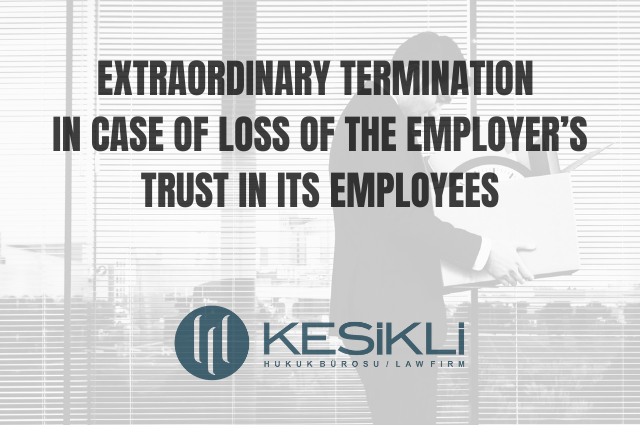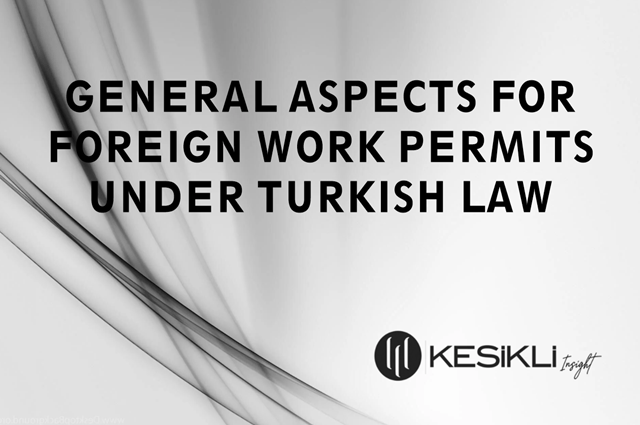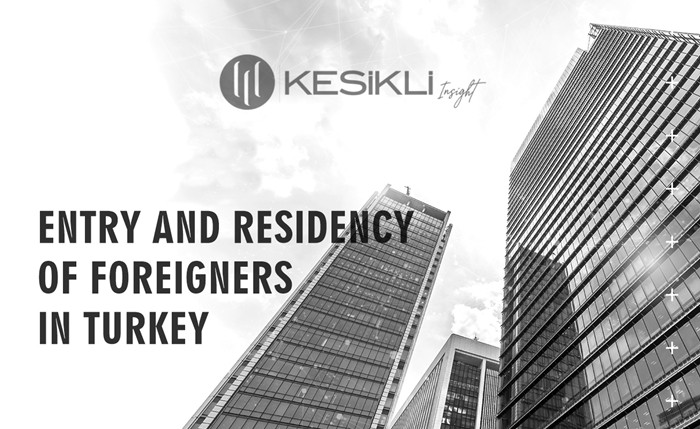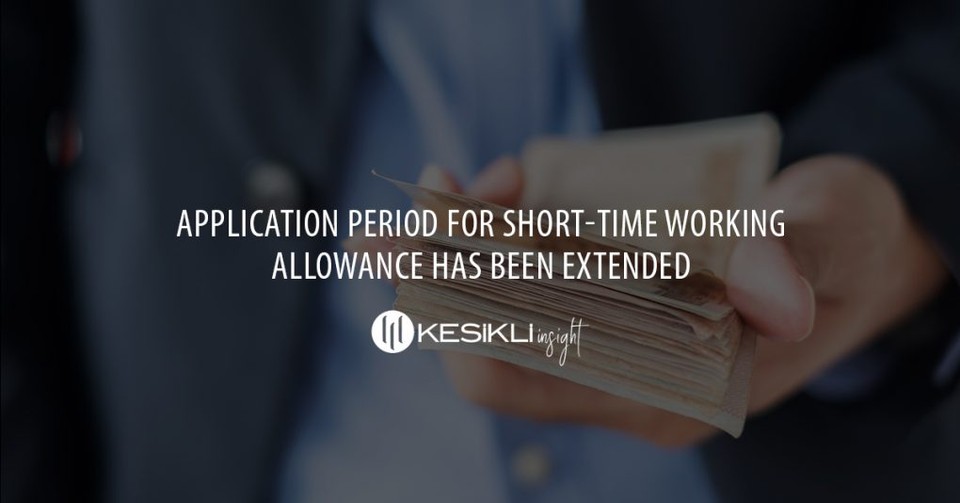COVID-19 Infection: Is it a Work Accident?
- COVID-19 and Infectious Diseases Under Turkish Law
Infectious diseases are defined under Infectious Diseases Regulation dated 30.05.2007. Although COVID-19 is not included within the list annexed to the Regulation categorizing infectious diseases, MERS (Middle East Respiratory Syndrome) and SARS (Severe Acute Respiratory Syndrome) which are coronavirus related diseases are considered as infectious diseases. Therefore, we are of the opinion that COVID-19 may also be regarded as an infectious disease according to the Regulation.
- Employee’s infection with an infectious disease while performing its works – may it be considered as a work accident?
Social Security Law No. 5510 (“Law No. 5510”) Article 13 defines “work accident” as follows:
Work accident is the incident which occurs;
- when the employee is at the workplace,
- due to the work carried out by the employer or by the employee if he/she is working freelance,
- for an employee working under an employer, at times when he/she is not carrying out his/her main work due to the reason that he/she is sent on duty to another place out of the workplace,
- for a nursing female employee under item (a) of paragraph one of Article 4 of this Law, at times allocated for nursing her child as per labour legislation,
- at the times the employee is going to or coming from the place, where the work is carried out, on a vehicle provided by the employer, and which causes, immediate or delayed, physical or mental disability to the employee.
According to the legislation, an accident may be considered as a work accident if such accident occurs as per Law No. 5510 Article 13 and causes physical or mental disability to the employee and there is causation between the said accident and the physical or mental damage to the employee.
Nowadays, it is a commonly asked question as to whether an employee’s infection with COVID-19 while performing its works at or outside the workplace can be regarded as a work accident.
The legislation provides a broad definition of work accidents under Law No. 5510 Article 13 and considers an accident as a work accident when any of the occurrences falls within under the scope of the said article. It should be noted that, Turkish Court of Appeal’s application in identification of an accident as a work accident do not necessarily require such occurrence to be associated with the employee’s works if such accident falls within the scope of Article 13 of the Law No. 5510. In this vein, Court of Appeals General Assembly of Civil Chambers (Yargıtay Hukuk Genel Kurulu)[[1]](https://www.kesikli.com/covid-19-infection-is-it-a-work-accident/#_ftn1) held in one of its decisions that it will be regarded as a work accident when an employee suffers heart attack at the workplace.
The fact that infectious diseases do not show their symptoms immediately within the incubation periods pose difficulties in determining whether the employee is infected with such disease while performing its works since the employee may apply to a health institution several days after the virus is caught.
Taking into consideration that incubation period of COVID-19 may be up to 14 days, the employee may start suffering from the symptoms after 14 days following the infection at the workplace or a work trip. In a possible dispute, the courts would be required to investigate the date of infection by taking into account the incubation periods and the date when the employee started suffering from the symptoms.
Employer’s Liability In case of Work Accidents
However, we would like to highlight that identifying an occurrence as a work accident may not always result in civil or criminal liability of the employer although such occurrence will entitle the employee with certain payments and aids by the Social Security Institution (“SSI”). Since the employer’s liability depends on its fault in the event of a work accident, the court will determine fault of the employer and the employee and other parties (if any) in a possible lawsuit. In this vein, occupational health and safety precautions adopted by the employer, working conditions of the employees at the workplace and fault of the employee, employer and third parties in relation to a work accident gain prominence in the event of a work accident.
Court of Appeal (Yargıtay[[2]](https://www.kesikli.com/covid-19-infection-is-it-a-work-accident/#_ftn2)) defines the employer’s liability in relation to the work accidents as follows:
“… employer’s liability will only occur provided that there is a causation link between the work accident and the employer’s criminal intent or fault, employee’s breach in relation to occupational health and safety laws, criminal intent and default of third parties. Accordingly, determining the material facts that result in a work accident and calculating fault rates of the employer and other persons are of great importance in order to establish liability of the employer or third parties in relation to a work accident. Additionally, it should be noted that inevitability principle will be taken into account in determining liability of the employee and the employer.
While determining faults of the parties, the measures under Labour law, whether the employer adopted such measures and whether the employee complied with the measures taken by the employee should be analysed in the expert report subject to Labour Act Article 77. Inevitability may be accepted when an accident occurs even though measures were taken by the employer and the employee act in accordance with such measures.
Court of Appeal (Yargıtay[[3]](https://www.kesikli.com/covid-19-infection-is-it-a-work-accident/#_ftn3)) also decided that suicide committed by an employee will be considered as a work accident; however the employer’s liability should be analysed in terms of its fault in such an accident.
There is not a court precedent as to whether COVID-19 infection may be regarded as a work accident since the cases have been seen in Turkey for less than five months. We can see from the Court of Appeal (Yargıtay) decision that we have analysed in detail below that death of an employee due to H1N1 virus that he was infected while performing its works was concluded to be a work accident.
- 21st Court of Appeal’s Decision (Case No. 2018/5018, Decision No. 2019/2931, dated 15.04.2020)
In this case, a truck driver was sent to Ukraine in order to perform its works. After 2 days following his arrival in Turkey, the employee applied to a hospital as he did not feel well and was diagnosed with upper respiratory tract infection. Having visited another hospital 2 days later, the employee was diagnosed with H1N1 virus and died 10 days later.
Legal heirs of the employee filed a lawsuit claiming that the employee’s death was due to a work accident. The court of first instance rejected their claim and the case was appealed.
While deciding whether this incident is a work accident, the Court of Appeal initially analysed Article 13 of the Law No. 5510 and held that an incident which occurred during the time the employee is working at a foreign country may be considered as a work accident. Subsequently, the court pointed the possibility that infectious disease may show their symptoms after several days from infection since incubation periods may vary. In this vein, the court held that a work accident does not have to show its effects on the employee immediately. Therefore an incident may be regarded as a work accident regardless from whether it shows immediate or delayed effects on the employee provided that causation can be established between such incident and physical or mental damage to the employee.
The forensic report in this case indicated that the cause of death is H1N1 virus, incubation period for the H1N1 virus is between 1-4 days and the symptoms that the employee was suffering at the first hospital he visited after 2 days from returning back to Turkey from Ukraine are beginning symptoms of H1N1 virus. Having referred to the aforementioned forensic report, the Court of Appeal overruled the court of first instance decision and determined the death of the employee due to H1N1 virus as a work accident since the employee was infected with H1N1 virus while performing its work.
The Court of Appeal’s decision constitutes a crucial precedent in terms of the principles in determining an infectious disease as a work accident. According to the principles established with this decision, the courts will consider the incubation periods of the infectious diseases in determining the time and incident the employee was infected with such disease.
- Analysis of the Court of Appeal’s Decision and COVID-19
The referred decision of Court of Appeals may constitute an important precedent for infection of employees with COVID 19.
Considering the fact that COVID-19 cases are rapidly increasing through the persons who travelled abroad recently; the courts may examine whether COVID-19 can be regarded as a work accident in cases where the employee was sent to a foreign country to perform its works and infected with COVID-19. In this context, the employers should encourage their employees not to attend the workplace for 14 days as of their arrivals in Turkey and be aware of health conditions of their employees. However, it should be noted that COVID-19 infection cannot be considered as a work accident if the employee visited a foreign country for personal reasons, and was infected with COVID-19 during its visit. In this vein, it should be highlighted that employee’s infection with COVID-19 from its family or circle cannot be considered as a work accident since the employee would not be infected by means of the occurrences under Law No. 5510 Article 13 in such a scenario. In a possible lawsuit, the court would be expected to investigate as to whether there is any person with COVID-19 infection in the employee’s family or social life to identify the source of the employee’s infection with the virus. For instance; if the employee’s wife was confirmed to be infected with COVID-19 a few days before the employee was infected, it would be likely to be considered that the virus was transmitted from its wife to the employee comparing to the possibility of employee’s infection by one of the circumstances under Law No. 5510 Article 13. Therefore, in such a scenario, the court would probably not consider employee’s infection with COVID-19 as a work accident.
In a possible dispute, the courts would be required to investigate the date of infection by taking into account the incubation periods (1-14 days) and the date when the employee started suffering from the symptoms in determining whether such infection can be considered as a work accident.
However, identifying COVID-19 infection as a work accident under Law No. 5510 Article 13 is not sufficient to impose liability on the employer. In a possible lawsuit, in order to determine faults of the employer, the employee and third parties; the court should analyse whether the employer has taken necessary measures in terms of cleaning and hygiene to protect health and safety of the employees at the workplace against COVID-19 pandemic and whether the employee infected with COVID-19 complied with such measures. For instance; COVID-19 infection of an employee may not necessarily result in liability of the employer even though such infection is identified as a work accident under Law No. 5510 if it is determined by the court that the reason of such infection is solely because the employee did not comply with the health and safety rules, measures, instructions and warnings at the workplace.
It can also be seen that COVID-19 transmission among doctors, nurses and other health workers is rapidly increasing across the world and our country. In this respect, Local Health Authorities have been informed[[4]](https://www.kesikli.com/covid-19-infection-is-it-a-work-accident/#_ftn4) by the Social Security Institution in line with the court precedents mentioned above that in the event of an infection of health workers with COVID-19, health institutions must identify such infection as a work accident and inform the Social Security Institution accordingly.
However, SSI Circular No. 2020/12 dated May 7, 2020 highlights infectious nature of COVID-19 and provides that health institutions shall record the COVID-19 infection as “disease” under Law No. 5510 Article 15. Law No. 5510 Article 15 defines “diseases” as follows: “diseases suffered by the insured subject to Article 4/1(a) and 4/1(b) except work accidents and occupational diseases which result in incapacity of the employee to work”. Therefore, SSI does not consider COVID-19 infection as a work accident.
Although the SSI excludes COVID-19 from the scope of work accidents according to the aforementioned circular; we are of the opinion that controversies as to whether COVID-19 can be regarded as a work accident do not seem to be resolved when Court of Appeal’s (Yargıtay) decision examined under Section 3 above and other decisions where even heart attack and suicide of the employee was considered as work accidents subject to Article 13 of the Law No. 5510 are taken into account.
In conclusion, we are of the opinion that the courts may evaluate the circumstances of each case in accordance with the Court of Appeal precedents, social security law principles and liability principle in the event of a lawsuit where an employee that were infected with COVID-19 or its successors claim compensation.
@Sena Güngördü
(1) (https://www.kesikli.com/covid-19-infection-is-it-a-work-accident/#_ftnref1) Court of Appeals General Assembly of Civil Chambers (Yargıtay Hukuk Genel Kurulu) 2010/21-36 Case Number, 2010/67 Decision Number, Date: 03.02.2010
(2) (https://www.kesikli.com/covid-19-infection-is-it-a-work-accident/#_ftnref2) 10th Civil Chamber, Case No. 2018/5855, Decision No. 2018/10586, Date: 13.12.2018
(3) (https://www.kesikli.com/covid-19-infection-is-it-a-work-accident/#_ftnref3) 10th Civil Chamber, Case No. 2004/4465, Decision No. 2004/6425, Date: 05.07.2004
(4) (https://www.kesikli.com/covid-19-infection-is-it-a-work-accident/#_ftnref4) COVID-19 Work Accident Notice No. 72300690-918.01.
Let's Get Connected!



